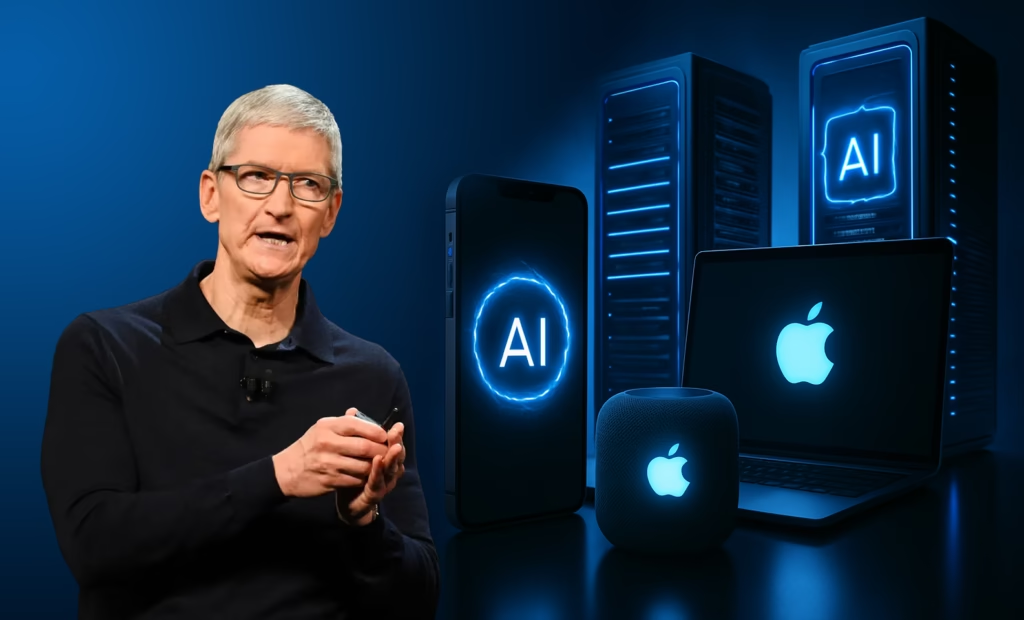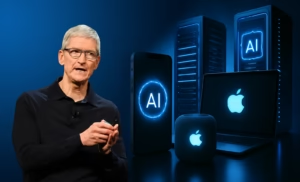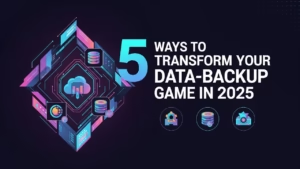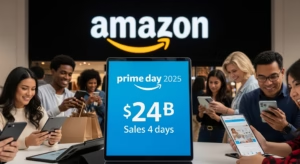For years, Apple has danced to its own beat, often arriving late to the party, only to steal the spotlight when it finally walks in. But with artificial intelligence, that swagger is being tested. While OpenAI, Google and Microsoft sprinted ahead with public launches and flashy rollouts, Apple sat still. At least, that’s how it looked on the surface.
Now, CEO Tim Cook is making it clear: Apple is done watching. It’s time to move.
And the company is going all in with a massive AI overhaul, billions in investment and a complete rebuild of Siri. But the question isn’t just if Apple can catch up. It’s whether the world will wait for it.
A Wake-up Call at Apple Park
In a rare, company-wide meeting at Apple’s Cupertino headquarters, Cook delivered a message that was more rally cry than keynote: “We must do this. Apple will do this.” His tone was unshakable. For Cook, AI isn’t just a trend. It’s the next internet, the next smartphone, the next cloud and Apple has no intention of missing the boat.
To some, that declaration feels overdue. Siri, once seen as the future, now lags behind AI assistants that didn’t exist two years ago. Apple, a company with a legacy of reinventing categories, now finds itself rebuilding a tool it once pioneered. And that reconstruction is massive: engineers scrapped the original hybrid plan of mixing old Siri code with new AI. it just didn’t meet “Apple quality”.
So they’re starting over.
Rebuilding Siri From the Ground Up
Mike Rockwell, the brains behind Vision Pro, is now steering Siri’s reinvention. Apple’s in-house AI team has been “supercharged,” as software chief Craig Federighi put it. Their mission: create a smarter, cleaner and context-aware Siri by 2026, one that doesn’t just talk, but actually thinks.
The company is also betting big on its own hardware and infrastructure. With a new AI server chip (“Baltra”) in development and a 250,000-square-foot facility rising in Houston, Apple’s cloud strategy, Private Cloud Compute, isn’t just about data storage. It’s a statement: we’ll do AI the Apple way, from chip to cloud.
But there’s a catch.
Too Late or Right Time?
While Apple spent the last three years debating chatbot usefulness and building its privacy-first architecture, the world raced ahead. ChatGPT became dinner-table conversation. Claude, Gemini and Copilot entered offices and classrooms. And now, Apple is playing catch-up, with an Siri reboot that won’t arrive until 2026.
Critics call it a strategic failure wrapped in elegant engineering. Supporters say it’s just Apple being Apple: arriving late, but arriving right.
Even internally, there’s friction. Some employees are questioning the direction of Apple’s AI group and whether leadership changes are needed to avoid falling even further behind. When your own engineers want to hit reset, it’s more than a technical problem. It’s a culture one.
The Privacy Dilemma
Apple’s relentless pursuit of user privacy, often its biggest bragging right, has become a double-edged sword. AI models thrive on data. Apple doesn’t collect much. Instead, it’s building ultra-secure servers, custom chips and a closed system to process AI privately.
It’s a technical masterpiece, but a strategic risk. In AI, speed and scale often trump elegance.
Competitors like OpenAI and Google are training models faster, with more data and releasing updates constantly. Apple, meanwhile, is building infrastructure most companies already use, just with more polish and more price.
AKI: Apple’s Answer to ChatGPT?
But there’s hope. Enter “Answers, Knowledge, and Information” (AKI), Apple’s secret team working on an answer engine that behaves more like ChatGPT. Spearheaded by Robby Walker under AI chief John Giannandrea, this team could finally give Apple the AI backbone it desperately needs.
Imagine a smarter Spotlight search, a more intuitive Safari, a Siri that can truly handle conversations, not just reminders and timers. If AKI delivers, Apple may not just catch up. It might leap ahead.
And perhaps that’s always been the plan.
Buying Time with Billions
Apple’s strategy now leans heavily on investment. In 2025 alone, it acquired seven AI startups, and it’s reportedly in talks with firms like Perplexity and Mistral. Cook has hinted at more M&A if it helps accelerate the roadmap. It’s not invention, it’s insurance.
This acquisition spree signals a new urgency. Apple isn’t just trying to innovate anymore. It’s trying to survive the narrative that it missed the AI revolution and it’s willing to spend its way back into relevance.
Cook teased an “amazing” product pipeline. Rumors swirl around a foldable iPhone, next-gen smart glasses, and robotics. A full Siri reboot. A smarter ecosystem. Maybe even a full-scale Apple AI assistant. But until 2026, most of it is still vaporware.
Apple has always played the long game. But in AI, long games don’t guarantee wins. By the time Apple’s new Siri rolls out, the world may already be speaking a different language, multimodal AI, autonomous agents, and tools we haven’t even imagined yet.
Still, if there’s one thing Apple’s history teaches us, it’s this: being late doesn’t mean being wrong.
And with $500 billion on the table, Cook’s not just betting on catching up.
He’s betting on redefining the race.
















